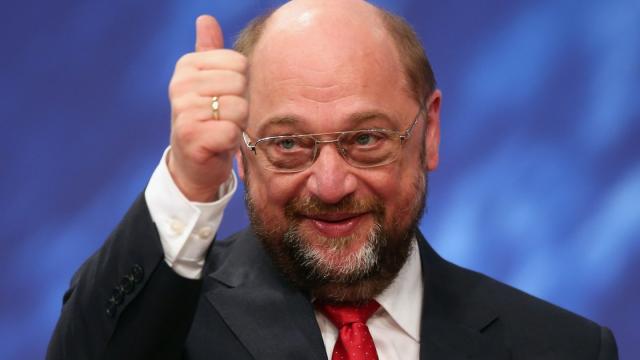
What seemed like the inevitable rise of the far-right across Europe grew a little less certain after Germany's anti-immigrant and euroskeptic Alternative für Deutschland (AfD) party suffered a considerable backslide in recent German polls. Instead, the popular backlash against AfD has seen an influx of voters shift toward the center-left Social Democratic Party (SPD), which until recently was languishing in the political wilderness but now appears to be enjoying a popular rebirth, as more Germans turn away from the policies championed by Angela Merkel's Christian Democratic Union (CDU).
A big reason for the shift – if the Internet is to be believed – is the SPD's newly appointed candidate for chancellor, Martin Schulz, who is already making waves within Germany and even, to a lesser degree, outside it. Schulz has a dedicated subreddit (r/The_Schulz), a Twitter account that posts on his behalf, and a host of memes that have helped spread awareness about his salt-of-the-Earth candidacy. But in order to understand the appeal of Schulz to the German public, it's important to know a bit about where he comes from.
The Other Side of Populism
Martin Schulz is, to many, the picture-perfect model of a Social Democrat: At 61, he is a working-class European, a failed soccer professional hopeful, and a politically correct Europhile who suffered for years in a string of blue-collar, low-paying jobs before finally deciding to throw his hat into Germany's political ring.
Since his nomination, the SPD has enjoyed a boost of more than 6,000 new members and beat the CDU in recent polls, with 32 percent voter preference over the governing party's 30.5 percent. In keeping with his own populist leanings, Schulz is no stranger to grandiose statements, such as his comment at a recent rally: "Yes! On September 23... we will wake up with an election win for the SPD."
The statement elicited wild cheers from his supporters, but the Germans – and Europe – are a long way from September. It's instructive to recall that the SPD was in a similar position in 2012, when it almost appeared to overcome Merkel's CDU only to get shot down on election day. However, this time around, Schulz's rising star might not be entirely attributed to his own appeal.
Merkel Fatigue
After 12 years of almost complete dominance in German government, Chancellor Angela Merkel is facing considerable pushback from a restive electorate that initially turned to the AfD in an attempt to find a party that was antithetical to the CDU's unpopular line. But when the far-right, xenophobic party began last year to reveal its true colors, the surge toward the SPD was almost cataclysmic.
Seeming to create a perfect political storm, the CDU came under fire in February after the German government began planning the implementation of handouts to Syrian immigrants in a bid to goad them out of Germany – a course of action that Polish Interior Minister Mariusz Blaszczak called “an example of German arrogance.”
Voters' visceral response shows a German electorate that is looking to a politician who isn't afraid to give his audience and opposition a piece of his mind; has few ties to establishment circles; and who seems more than eager to disrupt a governing party that seems to have overstayed its welcome.
Problems Emerging
Already, however, Martin Schulz has come under fire for suspicion over his personal spending, in which some of his European Parliament-member living and salary arrangements appeared to go above and beyond the acceptable fare. Yet even with the threat of an impending financial investigation, voters seem steadfast in their support for the SPD's new leading face.
But how does Schulz's message tie into the grander scheme of German and European politics, and how is he distinguishing himself from the CDU?
Making Europe Great Again?
In July 2016, in the aftermath of the Brexit vote, Martin Schulz made his bid for a truly federal European Union by saying that it was time for "a genuine European government" to replace the unelected European Commission, thus allowing dissatisfied citizens to "replace one European government with another through elections."
While Martin Schulz's idea was sound on paper, his statement was deemed inflammatory and came under considerable pressure, which nearly forced his resignation. Now, as Schulz contends for the position of German chancellor, and with the SPD's manifesto openly proclaiming the need to set up a truly "supranational, transparent government" with certain features of the German bureaucracy transferred to the European level, some are wondering if the SPD's rise to power won't lead to other unprecedented shifts across the European Union.
Perhaps Schulz's vision, expressed in his ironic "Make Europe Great Again" slogan, will enable the E.U. to take the first step out of its current state of uncertainty and instability. Then again, the world's political histories are littered with the shattered dreams of the ideologically hopeful. No one will know, until at least September, when the German people cast their vote to usher in change, of one form or another.
3 WAYS TO SHOW YOUR SUPPORT
- Log in to post comments












